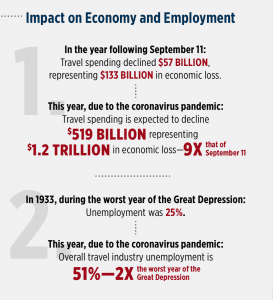Skift Take
Though there is evidence of pent-up travel demand as U.S. reopens bit by bit, the monumental job losses for our sector will take a long time to come back to the pre-pandemic level, if ever. This is travel's Great Depression of this century, make no mistake.
That’s the stark reality of an industry that has completely come to a standstill. While there are green shoots as we look forward to summer, the immediate toll on employment in the travel sector in U.S. — and worldwide — is monumental. And will likely be there long term.
 The numbers compiled and just released by U.S. Travel Association speak to this: More than half of the 15.8 million travel-related jobs in the U.S. have disappeared since the outbreak of this pandemic — driving an unemployment number (51 percent) that is more than twice the 25 percent rate the country as a whole experienced at the worst of the Great Depression. Travel-related job losses represent 38 percent of all job losses through April—nearly 10 million Americans.
The numbers compiled and just released by U.S. Travel Association speak to this: More than half of the 15.8 million travel-related jobs in the U.S. have disappeared since the outbreak of this pandemic — driving an unemployment number (51 percent) that is more than twice the 25 percent rate the country as a whole experienced at the worst of the Great Depression. Travel-related job losses represent 38 percent of all job losses through April—nearly 10 million Americans.
For this Memorial Day holiday weekend, usually the start of a busy summer travel season, travel spending in the U.S. will be just a third of last year’s levels—$4.2 billion this year versus $12.3 billion in 2019, most of it likely to be spent locally and regionally close to where people live.
Roger Dow, CEO of U.S. Travel Association, lays it out clearly: “While the economy is in the midst of a recession, the travel industry is in a depression.” There you have it.
The Daily Newsletter
Our daily coverage of the global travel industry. Written by editors and analysts from across Skift’s brands.
Have a confidential tip for Skift? Get in touch
Tags: employment, labor, US Travel Association
Photo credit: Franklin Delano Roosevelt Memorial in Washington D.C., depicting scenes from the Great Depression in sculpture.
